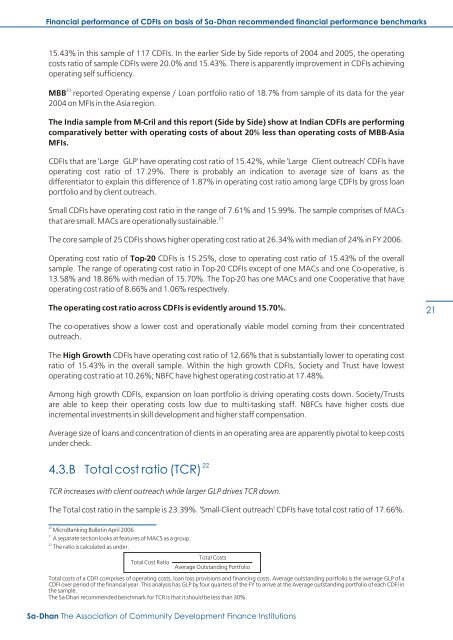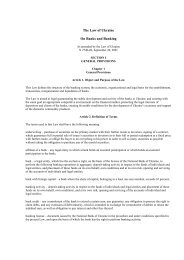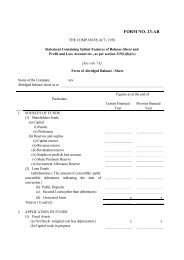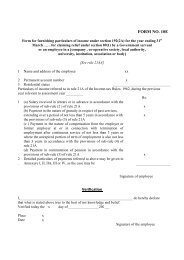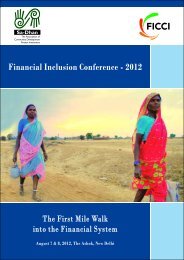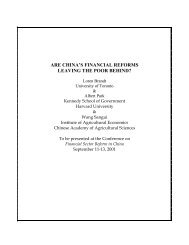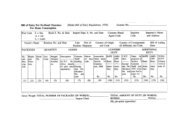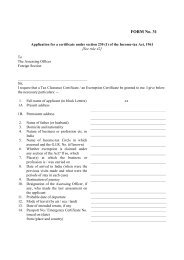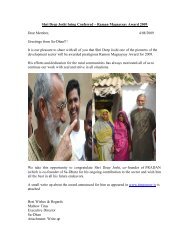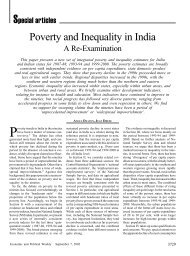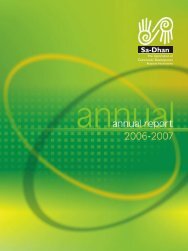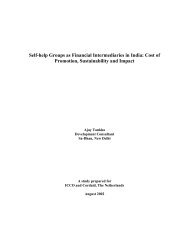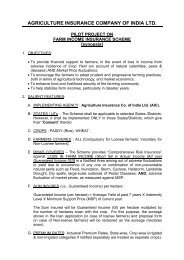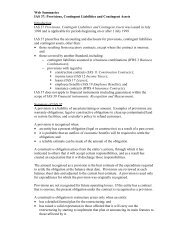Read - Sa-Dhan
Read - Sa-Dhan
Read - Sa-Dhan
You also want an ePaper? Increase the reach of your titles
YUMPU automatically turns print PDFs into web optimized ePapers that Google loves.
Financial performance of CDFIs on basis of <strong>Sa</strong>-<strong>Dhan</strong> recommended financial performance benchmarks<br />
15.43% in this sample of 117 CDFIs. In the earlier Side by Side reports of 2004 and 2005, the operating<br />
costs ratio of sample CDFIs were 20.0% and 15.43%. There is apparently improvement in CDFIs achieving<br />
operating self sufficiency.<br />
20<br />
MBB reported Operating expense / Loan portfolio ratio of 18.7% from sample of its data for the year<br />
2004 on MFIs in the Asia region.<br />
The India sample from M-Cril and this report (Side by Side) show at Indian CDFIs are performing<br />
comparatively better with operating costs of about 20% less than operating costs of MBB-Asia<br />
MFIs.<br />
CDFIs that are 'Large GLP' have operating cost ratio of 15.42%, while 'Large Client outreach' CDFIs have<br />
operating cost ratio of 17.29%. There is probably an indication to average size of loans as the<br />
differentiator to explain this difference of 1.87% in operating cost ratio among large CDFIs by gross loan<br />
portfolio and by client outreach.<br />
Small CDFIs have operating cost ratio in the range of 7.61% and 15.99%. The sample comprises of MACs<br />
21<br />
that are small. MACs are operationally sustainable.<br />
The core sample of 25 CDFIs shows higher operating cost ratio at 26.34% with median of 24% in FY 2006.<br />
Operating cost ratio of Top-20 CDFIs is 15.25%, close to operating cost ratio of 15.43% of the overall<br />
sample. The range of operating cost ratio in Top-20 CDFIs except of one MACs and one Co-operative, is<br />
13.58% and 18.86% with median of 15.70%. The Top-20 has one MACs and one Cooperative that have<br />
operating cost ratio of 8.66% and 1.06% respectively.<br />
The operating cost ratio across CDFIs is evidently around 15.70%.<br />
The co-operatives show a lower cost and operationally viable model coming from their concentrated<br />
outreach.<br />
21<br />
The High Growth CDFIs have operating cost ratio of 12.66% that is substantially lower to operating cost<br />
ratio of 15.43% in the overall sample. Within the high growth CDFIs, Society and Trust have lowest<br />
operating cost ratio at 10.26%; NBFC have highest operating cost ratio at 17.48%.<br />
Among high growth CDFIs, expansion on loan portfolio is driving operating costs down. Society/Trusts<br />
are able to keep their operating costs low due to multi-tasking staff. NBFCs have higher costs due<br />
incremental investments in skill development and higher staff compensation.<br />
Average size of loans and concentration of clients in an operating area are apparently pivotal to keep costs<br />
under check.<br />
22<br />
4.3.B Total cost ratio (TCR)<br />
TCR increases with client outreach while larger GLP drives TCR down.<br />
The Total cost ratio in the sample is 23.39%. 'Small-Client outreach' CDFIs have total cost ratio of 17.66%.<br />
20<br />
MicroBanking Bulletin April 2006<br />
21<br />
A separate section looks at features of MACS as a group.<br />
22<br />
The ratio is calculated as under.<br />
Total Cost Ratio<br />
Total Costs<br />
Average Outstanding Portfolio<br />
Total costs of a CDFI comprises of operating costs, loan loss provisions and financing costs. Average outstanding portfolio is the average GLP of a<br />
CDFI over period of the financial year. This analysis has GLP by four quarters of the FY to arrive at the Average outstanding portfolio of each CDFI in<br />
the sample.<br />
The <strong>Sa</strong>-<strong>Dhan</strong> recommended benchmark for TCR is that it should be less than 30%.<br />
<strong>Sa</strong>-<strong>Dhan</strong> The Association of Community Development Finance Institutions


